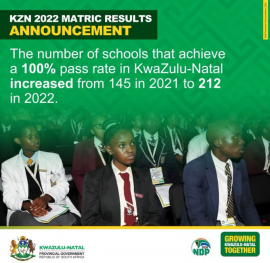
KwaZulu-Natal Premier, Nomusa Dube-Ncube, has encouraged learners to consider Technical Vocational Education and Training Colleges (TVET) as their alternative to university education.
Speaking during the announcement of KwaZulu-Natal’s matric results held in Durban on Friday, Premier Dube-Ncube noted that one of the reasons why government adopted the three-stream model in the education system was to accommodate some leaners who have skills but may find it hard to be accepted in universities.
“We are therefore encouraging leaners to also make use of the opportunity provided by TVET colleges. We have seen in the past few years a trend where industry and business is absorbing more graduates from TVETS as opposed to universities,” Dube-Ncube said.
Dube-Ncube commended the province’s Matric Class of 2022 for surpassing all expectations by achieving an 83% pass rate, exceeding the 80% pass rate benchmark set by the province.
“Last year, the floods pummelled KwaZulu-Natal causing damage to infrastructure and disrupted education. This resulted in 824 learners in eThekwini being placed among the displaced in 135 mass care centres, and later being moved into Temporary Residential Units (TRUs).
“Out of this number, at least 36 were in matric in 2022, and four had special needs. Despite these challenges, our resilience showed up. We ensured that these learners were given a fair chance and were not prejudiced by the impact of the flood disaster,” Dube-Ncube said.
The Premier said the 2022 results reflect an improvement in all the districts with Umkhanyakude being the most improved district and no school received a 0% pass rate in the province.
This follows the rollout of the Ten-Point Improvement Plan championed by provincial Education Department.
“These objectives were meant to guide all the interventions for the improvement of the performance of the matric class of 2022. The province undertook to improve performance in Mathematics and Physical Science and sought improvement in the total number of distinction passes in 2022 [and] progress was achieved in all these areas.
“Attention to special schools has also resulted in significant achievement overall. The province has worked hard to improve education of learners with learning barriers,” the Premier said.
She said the Department of Education will come up with a decisive intervention strategy to deal with the situation in the 11 schools that performed below 30%.
“We note that they were 22 in 2021 and now have reduced to 11. The Education Department must conduct an evaluation and introduce an academic improvement plan with immediate effect.
“The Executive Council will receive the report with school by school analysis and will assist with relevant interventions,” Dube-Ncube said.
The Premier also expressed her excitement about the increase in the number of Bachelor passes, as well as an improvement in the pass rate of township and rural schools that achieved 100% pass rate from 145 in 2021 to 212 in 2022.
“We are excited about the increase in the number of Bachelor passes from 37% in 2021 to 42.5% in 2022, which marks a 5.4% improvement. The province is also pleased that girl learners performed well.
“Girl learners obtained an overall pass percentage of 83.6% while the boy learners obtained 82.3%. We will continue to intervene to ensure that female learners have equal opportunities of success like male learners,” Dube-Ncube said.
Embracing the future and 4IR
The Premier also encouraged learners to take advantage of digitisation, robotics and the Fourth Industrial Revolution (4IR).
She said the provincial government is paying attention to subjects including Coding, Mathematics and Physical Science.
“The province also recently launched the Mobile Digital Analytics Skills Laboratory to ensure that young people are exposed to the Fourth Industrial Revolution. We have taken a decision as the Provincial Government that we must assess the viability of schools with a low enrolment rate.
“Our view is that some of them could be converted into Vocational Skills Centers to address among others the shortage of technical skills for the country. These include among others Artisan, Plumbers, Electricians, Construction and Carpentry,” the Premier said. – SAnews.gov.za


